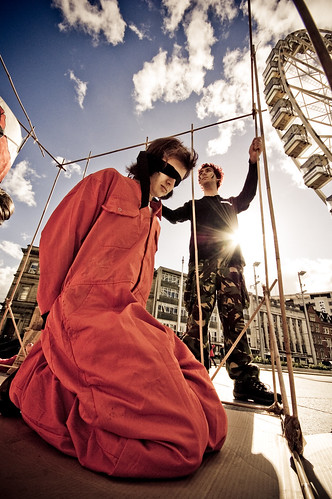 Omar Deghayes was born the son of a prominent Libyan lawyer, an "opponent of the increasingly totalitarian Gaddafi" later taken away by the Libyan authorities and killed. After his father's death, Omar Deghayes settled with his family in Saltdean, Great Britian. As a British resident and student of law, Deghayes was imprisoned in Guantanamo for six years after he was abducted from Pakistan and sold for bounty to the United States military. As many of his interviews rightly point out, Mr. Deghayes lost an eye after it was gouged by a Guantanamo guard.
Omar Deghayes was born the son of a prominent Libyan lawyer, an "opponent of the increasingly totalitarian Gaddafi" later taken away by the Libyan authorities and killed. After his father's death, Omar Deghayes settled with his family in Saltdean, Great Britian. As a British resident and student of law, Deghayes was imprisoned in Guantanamo for six years after he was abducted from Pakistan and sold for bounty to the United States military. As many of his interviews rightly point out, Mr. Deghayes lost an eye after it was gouged by a Guantanamo guard.
You were captured and detained between May 2002 and Dec 2007?
2007 May...April? Yes. I think. Probably May or April…yes.
Do you recall where you were held? Were you going from one camp to another? Do you remember those dates...?
No. It's going to be very difficult because when we were in the prisons in Guantanamo, we had no idea of dates or time.
It was difficult to...we didn't have any watches. We weren’t allowed to know dates or things...I think until 2005, when the lawyers started to come in…we started to have some idea of the dates.
And then after that I think 2006 we were allowed to know what time...they had time...a big clock hanging in some of the...not the cells...but in the middle in between the cells. So, it would be difficult to say which dates I was in which prison and so on...
Do you have a recollection of the places that you were actually held?
Yes. Yes. I do. Yes. Even though we weren't allowed to even know that. But we eventually did know where we are.
Where were you first?
I was first in Lahore. I was kept in Lahore prison for two months. And I think it was a maximum security in Lahore. Kind of a fortress, which is made special for, I think, terrorism cases and things like that. There are some Pakistani people there. And some Arabs.

Hundreds of detainees at Guantanamo Bay are known to have engaged in hunger strikes at the prison in protest of conditions and their prolonged confinement without trial. A recent report from Jason Leopold of Truthout.org details how, as of March, detainees continue to participate in hunger strikes with the hope that the conditions of their detention will improve or so they will no longer have their basic due process rights violated.
Detainees first began to engage in hunger strikes in 2002. The hunger strikes had a definite impact. The strikes from 2002 to 2005 effectively changed the dynamics in the prison. Former detainee Binyam Mohamed said there was no law and a colonel was saying, “’I do what I like’ but after the hunger strike – the big hunger strike of 2005 – they actually started implementing some kind of law that we knew about.” But, come 2006, the prison began to force feed detainees that were striking and would force tubes down detainees’ throats in a manner that successfully convinced many of the detainees to end their resistance.
Theme by Danetsoft and Danang Probo Sayekti inspired by Maksimer